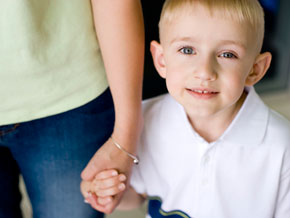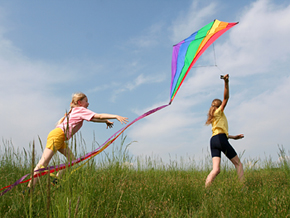Raising a Free-Range Kid

Photo: © 2009 Jupiterimages Corporation
Some parents believe they have to protect their children from harmful people and situations, but what happens when you're shielding your child from everything? Writer Lenore Skenazy explains why independent children might be the safer ones after all.
Around the country, clever Parent Teacher Associations have started auctioning off a new item: the drop-off space directly in front of the school—the sweet spot where kids walk the fewest steps between car and classroom. It's a spot that, anywhere else, would be called "handicapped parking." In other words: Parents are vying for the chance to treat their kids like invalids. Sound a little crazy? Welcome to helicopter parenting.
Helicopter parents believe their job is to watch, encourage and smooth the way for their kids every day in every way. It's a phenomenally popular parenting method, but it doesn't seem to be working very well. Hovered-over kids get the message that they are brilliant, wonderful, beloved—but also vulnerable, incompetent and in constant danger. And the message parents get is worse! There is a ton of pressure on helicopter parents to produce the perfect child...or else.
That pressure starts even before birth. Crack open that first "So You're Pregnant!" book and it'll tell you all about how every single bite you take can help—or hurt—that future Einstein you're carrying. And speaking of Einstein, once the baby pops out, there's a tower of educational toys you're supposed to buy, lest your child fail to switch on every single synapse. Forget the fact that Einstein himself spent hours doing what new-fangled, ultra-stimulating activity as a child?
He made houses out of cards. And not even flash cards.
As our kids develop, we're sold stuff our parents' generation never even heard of. Baby knee pads to "help" them crawl. Baby "wings" that work like marionette strings to "help" kids walk. (Like otherwise they'd never stand upright?) There are special place mats to teach kids their colors between bites of zwieback and DVDs to teach them, I kid you not, all about water. As if the best way to learn isn't by plopping the kid in a bath and letting 'em splash!
And by the way, even that splash is now subject to high-tech monitoring. Perhaps you've seen the Baby Bathwater Temperature Duck? It's a rubber ducky you put in the bath and if the words "too hot" appear on its bottom, the water is...
Well, guess. Never mind this warning on the package: "Adult should always place hand in bathwater to test temperature." So who needs the dumb duck?

Photo: © 2009 Jupiterimages Corporation
The sneaky message behind all these safety and educational products is this: Whatever you and your baby were born with isn't enough. Sure, your baby was born with adorably chubby knees. But are these safe enough to crawl on? Sure, you can test the bath water yourself, but are you smart enough to tell if it's hot?
Of course you are! But when you're surrounded by products insisting you're not, it's hard not to worry that you're not doing the best for baby. The helicopter parenting this encourages is a radically new childrearing notion, and it isn't working very well.
Consider the fact that when Sesame Street first debuted in 1969, it was designed by a battery of child psychologists to model the ideal childhood. So if you get the DVD set Sesame Street: Old School, and you watch the highlights from back then, you see giddy kids playing follow the leader, by themselves. You see kids playing in a vacant lot, by themselves. You see happy kids actually entertaining themselves. (Without a GameBoy!) But first, this warning appears on the screen:
"These early Sesame Street episodes are intended for grown-ups."
Oh, come on! Since when?
Since what was considered a fun, wholesome and educational childhood just a generation ago is now considered insanely risky. See-you-on-local-news risky! And so parents are getting the message: Anytime your kids do anything on their own, something terrible could happen and it's all your fault.
The fear for our kids mingles with the fear of blame, and so we lock them inside, where they snack and play video games. Or we chauffeur them to supervised activities and then chauffeur them back home. Is it any wonder our kids are getting fat? Any wonder so many of them seem depressed? Any wonder that our kids can fill out a standardized test but don't know how to organize their own game of Mother, May I?
Of course you are! But when you're surrounded by products insisting you're not, it's hard not to worry that you're not doing the best for baby. The helicopter parenting this encourages is a radically new childrearing notion, and it isn't working very well.
Consider the fact that when Sesame Street first debuted in 1969, it was designed by a battery of child psychologists to model the ideal childhood. So if you get the DVD set Sesame Street: Old School, and you watch the highlights from back then, you see giddy kids playing follow the leader, by themselves. You see kids playing in a vacant lot, by themselves. You see happy kids actually entertaining themselves. (Without a GameBoy!) But first, this warning appears on the screen:
"These early Sesame Street episodes are intended for grown-ups."
Oh, come on! Since when?
Since what was considered a fun, wholesome and educational childhood just a generation ago is now considered insanely risky. See-you-on-local-news risky! And so parents are getting the message: Anytime your kids do anything on their own, something terrible could happen and it's all your fault.
The fear for our kids mingles with the fear of blame, and so we lock them inside, where they snack and play video games. Or we chauffeur them to supervised activities and then chauffeur them back home. Is it any wonder our kids are getting fat? Any wonder so many of them seem depressed? Any wonder that our kids can fill out a standardized test but don't know how to organize their own game of Mother, May I?

Photo: © 2009 Jupiterimages Corporation
We do our children no favor when we cripple their independence to make them safer. And guess who shares this assessment? The head of the National Center for Missing and Exploited Children—the organization that put the missing kids' pictures on the milk cartons!
"Our message to parents is you don't have to live in fear; you don't have to feel you have to lock your children in a room," says Ernie Allen, the organization's president and chief executive officer.
Even when it comes to that mother of all worries—abduction—the safest kids are not the helicoptered ones. They're the ones with enough street smarts and self-confidence to stand up for themselves, whether that's to bullies or to the proverbial man in a windowless van. And how do kids get that kind of confidence—the kind where they're ready to scream, "Get away!" and kick and run?
Self-confidence comes from doing things on your own, whether that's making a tree fort or making dinner. That's why it is called "self"-confidence rather than "parent-assisted"-confidence.
As parents, our job is not to watch our kids 24/7. It's to give them the skills and confidence to take on the world. Good parents give their children roots and wings. And then?
We stand back and watch them soar.
Lenore Skenazy is founder of FreeRangeKids and author of Free-Range Kids: Giving Our Children the Freedom We Had Without Going Nuts with Worry. (Wiley)
"Our message to parents is you don't have to live in fear; you don't have to feel you have to lock your children in a room," says Ernie Allen, the organization's president and chief executive officer.
Even when it comes to that mother of all worries—abduction—the safest kids are not the helicoptered ones. They're the ones with enough street smarts and self-confidence to stand up for themselves, whether that's to bullies or to the proverbial man in a windowless van. And how do kids get that kind of confidence—the kind where they're ready to scream, "Get away!" and kick and run?
Self-confidence comes from doing things on your own, whether that's making a tree fort or making dinner. That's why it is called "self"-confidence rather than "parent-assisted"-confidence.
As parents, our job is not to watch our kids 24/7. It's to give them the skills and confidence to take on the world. Good parents give their children roots and wings. And then?
We stand back and watch them soar.
Lenore Skenazy is founder of FreeRangeKids and author of Free-Range Kids: Giving Our Children the Freedom We Had Without Going Nuts with Worry. (Wiley)
More on Helicopter Parenting






